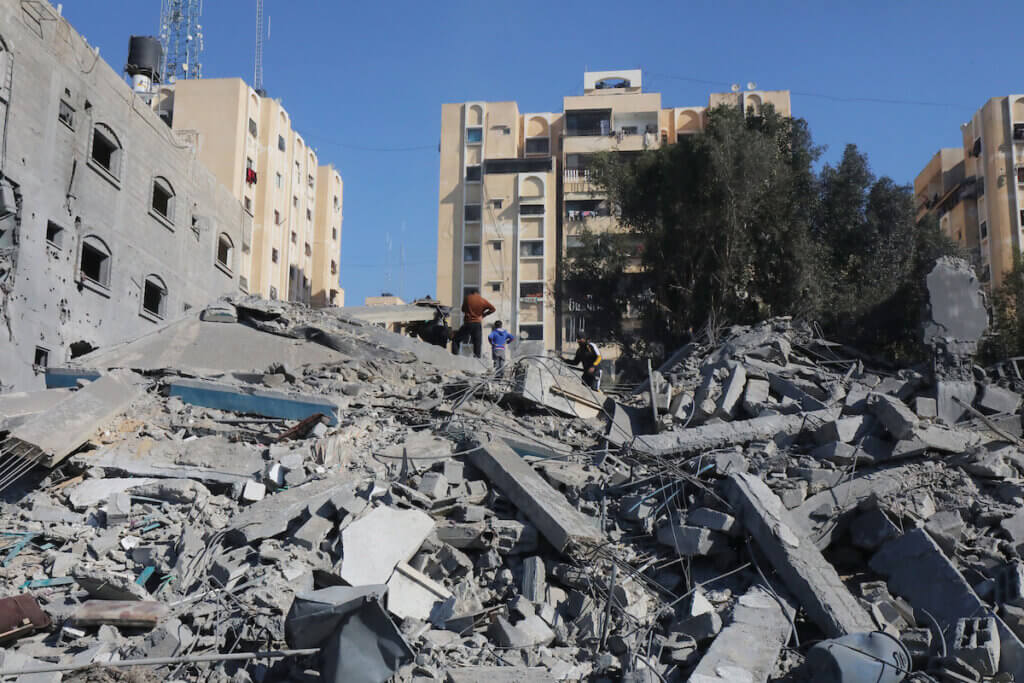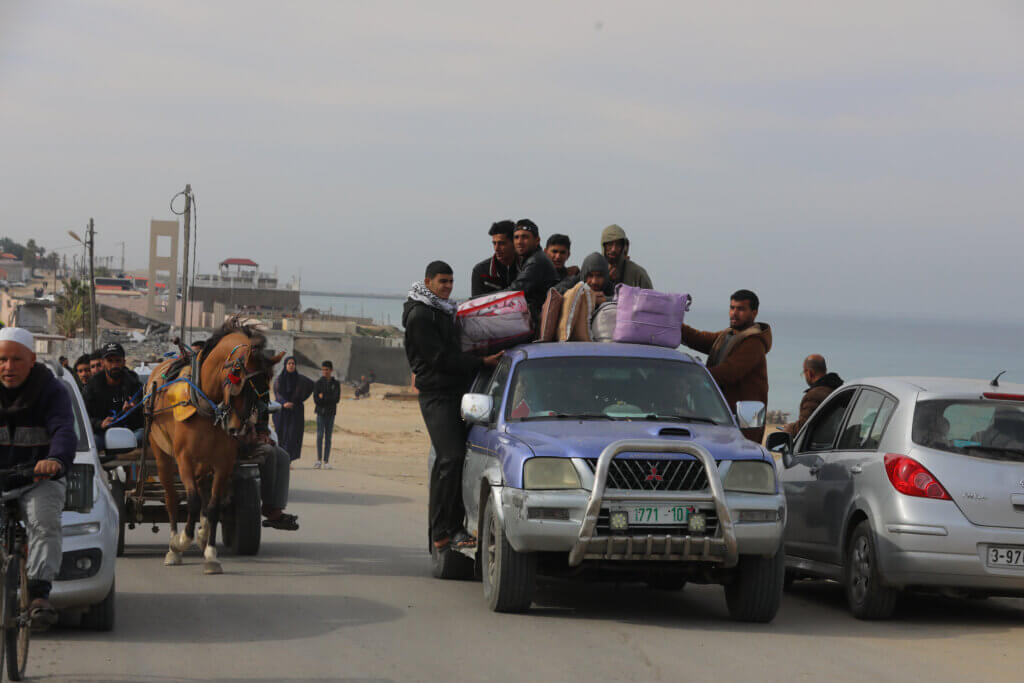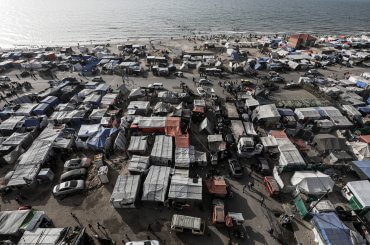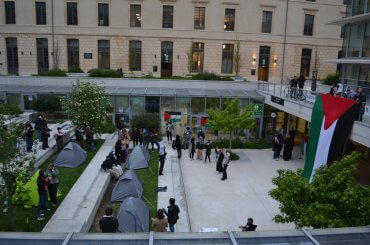Jamila Eleywa, 66, gathered what little belongings remained to herself and her two surviving granddaughters and packed them into several bags. The elderly woman had decided to return to Nuseirat refugee camp in the central Gaza Strip after she heard that the impending Israeli invasion of Rafah was all but guaranteed, resolving to leave her current refuge to avoid the slaughter she knew would follow.
Jamila has lost 90 family members since the start of the war, all of them first and second-degree relatives. Most of them died when their homes were targeted by Israeli airstrikes in Nusierat and the village of Zuwayda, well before the areas had been evacuated to Rafah in early December of last year.
Like so many others, Jamila was displaced from one place to another. Many stops along the way included uninhabitable shelters, such as storage units and commercial stores, enduring hunger, thirst, and lack of access to medical care.
Jamila’s primary concern the entire time was for Yara and Lara, her two young granddaughters who lost their mother and baby sister after their house in Nuseirat was targeted.
When their grandmother told them to prepare to leave Rafah, the two girls thought that the war was over, oblivious to the fact that they were moving from one hell to another.
When Jamila finished packing, she attempted to call a car to transport them back to Nuseirat. After numerous attempts, she was able to secure the number of a truck driver on account of her large amount of belongings. When they had first fled Nusierat, they left already anticipating a long period of displacement, bringing with them portable solar panels, batteries, clothes, mattresses, and pillows.
Jamila agreed with the truck driver that he would pick them up the next day and take them to Nusierat. He asked for $500 for the trip. Normally, that same journey would have cost only $70, but wartime has changed everything.
The night before leaving was difficult for Jamila, as Israeli forces targeted numerous homes in Rafah and killed 150 Palestinians, making it one of the most horrific nights for the girls since the start of the war.
Accompanied by the perpetual Israeli statements promising that the army would invade Rafah soon, the past few weeks served to terrorize the civilian population in Rafah. Thousands began to flee back up north, heading towards the cities and refugee camps of central Gaza. The campaign of forced displacement has been caught on camera for all to see, repeated again and again throughout the war. But the difference during this most recent campaign is that there is nowhere to flee. Wide swathes of central Gaza have been leveled and converted into an open field for the Israeli army’s operations.
“We spent a terrifying night in Rafah before deciding to return to central Gaza,” Jamila told Mondoweiss. “My granddaughters were screaming when the bombs dropped near us. My two girls spent an entire day trapped under the rubble last October when their sister and mother were killed while they were all asleep.”
“When we heard that same familiar sound that they had heard on the day their mother was killed, none of us could bear it anymore,” Jamila continued. “They kept crying, saying ‘this time we’re going to die like mama and our sister Judy.’”
In a previous Mondoweiss article, we told the story of Wa’d Abu Shouq, the mother of Lara, Yara, and Judy, who died alongside Judy in the airstrike. When their bodies were recovered, they could not remove Judy from Wa’d’s arms, so they wrapped them up in the same shroud and buried them together.
Jamila said that the decision to return to central Gaza was mainly informed by the need to calm Lara and Yara, who were gripped with terror at reliving the day their mother was taken from them. This did not make the refugee camps of central Gaza any safer, however, since the army’s threats of invasion also encompassed those areas.
“The coastal road from Rafah to Nusierat was terrifying, even though thousands were walking that road,” Jamila recounted to Mondoweiss. “We walked under the gaze of the Israeli warships, which were not far away. And the Israeli surveillance drones were above us.”
“We passed by Khan Younis on our way there,” she continued. “And we could hear the sound of the bullets and the artillery shells. We thought we wouldn’t be able to get through to the other side.”

‘No homes remained’
Jamila likened the moment she entered her neighborhood in Nuseirat to entering a ghost town.
“The housing blocks weren’t just struck — they were bulldozed and cleared away,” she explained. “The neighborhood I lived in had been turned into an empty field with nothing left but sand. No homes remained. All of our neighbors’ and family members’ houses were cleared away.”
“And as far as the eye can see, there were bombed-out buildings,” she continued. “Some were still standing with only a few stories targeted, some had completely collapsed, and some were only partially destroyed. It was like a ghost town, and at night, it felt like there were no signs of human life.”
“No supermarkets, no bakeries, no indication that any people can exist in this place,” she emphasized.
After reaching Nuseirat, they made their way to Jamila’s sister’s house, which had escaped the bombardment. Yet access to food and water was far worse than it had been in Rafah, where basic necessities were somewhat more available.
Jamila said that her son spent most of his days wandering the area with an empty gallon, searching for water for their family of thirteen people. Yet Jamila viewed the daily struggle to secure their needs as preferable to waiting for death in Rafah and hearing the terror in her granddaughters’ voices.
Jamila admitted that the decision to leave Rafah was not necessarily a rational one, but the price of staying for her granddaughters was one that Jamila could not bear to pay. She believes her granddaughters need psychological treatment, but instead, they’ve continued to be displaced and exposed to these conditions.
“In the end, we escaped death to walk into a different kind of death,” Jamila observed.
‘I can’t bear life without them’
Na’ima al-Hurk, 55, another displaced person who lived in a tent in al-Mawasi, the western part of Rafah near the coast, picked up her belongings along with her family and headed to Nuseirat after hearing about the impending operation.
Na’ima said that she wanted to escape any place where the army was nearby, having heard countless stories of soldiers executing young men in cold blood in front of their families.
“I saw with my own eyes on social media a father speaking to a journalist about how the soldier told him, ‘I want to kill your son,’ without giving any reason,” Na’ima told Mondoweiss. “He was crying and saying that they killed his son in cold blood.”
Na’ima is a mother to five young men aged between 17 and 25. “I don’t want to lose my sons. Who would I live for if they are gone?”
“I can’t bear life without them,” Na’ima said.
After they reached Nuseirat and set up a new tent, they received a warning from the Israeli army to clear the area.
“An entire housing block of over fifty homes was ordered to evacuate,” Na’ima said. “And then they kept pummeling the area all night and into the next day.”
She explained that this pattern has become familiar in Nuseirat refugee camp. The army orders a housing block to clear the area, then it bombs the area until it is completely leveled. It then moves on to the next housing block and does the same all over again.
“They want to destroy the entire camp,” Na’ima explained.
“I’m sick of this life, of attempting to escape death at every turn,” she sighed. “My entire life, I’ve lived through continuous wars, one war after another. But I have never experienced anything like this in my entire life.”


